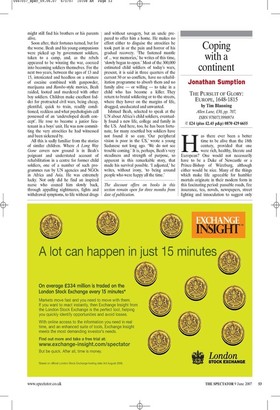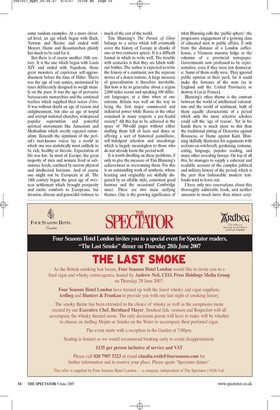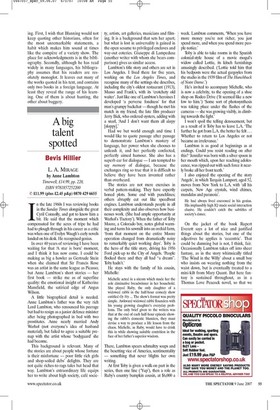Coping with a continent
Jonathan Sumption THE PURSUIT OF GLORY: EUROPE, 1648-1815 by Tim Blanning Allen Lane, £30, pp. 707, ISBN 9780713990974 © £24 (plus £2.45 p&p) 0870 429 6655 Has there ever been a better time to be alive than the 18th century, provided that one were rich, healthy, literate and European? One would not necessarily have to be a Duke of Newcastle or a Prince-Bishop of Warzburg, although either would be nice. Many of the things which make life agreeable for humbler mortals originate in their modern form in this fascinating period: passable roads, fire insurance, tea, novels, newspapers, street lighting and innoculation to suggest only some random examples. At a more elevated level, an age which began with Bach, Newton and Racine and ended with Mozart, Hume and Beaumarchais plainly has much to be said for it.
But there is of course another 18th century. It is the one which began with Louis XIV and ended with Napoleon, those great monsters of capricious self-aggrandisement before the time of Hitler. Theirs was the age of vast armies, maintained by taxes deliberately designed to weigh mainly on the poor. It was the age of pervasive bureaucratic monarchies and the continual warfare which supplied their raison d'être. It was without doubt an age of reason and enlightenment, but also an age of torpid and corrupt national churches, widespread popular superstition and powerful spiritual movements like Jansenism and Methodism which overtly rejected rationalism. Beneath the optimism of the period's best-known voices lay a world in which one was statistically most unlikely to be rich, healthy or literate. Expectation of life was low. In most of Europe, the great majority of men and women lived at subsistence levels, confined by narrow physical and intellectual horizons. And of course one might not be European at all. The 18th century began the great age of overseas settlement which brought prosperity and exotic comforts to Europeans, but invasion, disease and genocidal violence to much of the rest of the world.
Tim Blanning's The Pursuit of Glory belongs to a series which will eventually cover the history of Europe in chunks of one or two centuries apiece. It is a difficult format in which to write well. The trouble with centuries is that they are labels without bottles. The author is expected to write the history of a continent, not the separate stories of a dozen nations. A large measure of generalisation is therefore inevitable. But how is he to generalise about a region 2,000 miles across and speaking 100 different languages, at a time when at one extreme Britain was well on the way to being the first major commercial and industrial power while Russia at the other remained in many respects a pre-feudal society? All this has to be achieved in the space of 700-odd pages without either stuffing them full of facts and dates or offering a sort of historical pointillisme, self-indulgent selection and anecdotage which is largely meaningless to those who do not already know the period well.
It is worth dwelling on these problems, if only to give the measure of Tim Blanning's achievement in overcoming them. For this is an outstanding work of synthesis, whose learning and originality are skilfully disguised by an affable style, consistent good humour and the occasional Cambridge sneer. There are two main unifying themes. One is the growing significance of what Blanning calls the 'public sphere': the progressive engagement of a growing class of educated men in public affairs, if only from the distance of a London coffeehouse, a Viennese masonic lodge or the columns of a provincial newspaper. Governments now professed to be representative, even if they were not democratic. Some of them really were. They ignored public opinion at their peril, for it could make the fortunes of the state (as in England and the United Provinces) or destroy it (as in France).
Blanning's other theme is the contrast between the world of intellectual rationalism and the world of sentiment, both of them equally characteristic of a period which only the more selective scholars could call the 'age of reason'. Yet in his hands there is much more to this than the traditional pitting of Descartes against Rousseau, or Hume against Kant. Blanning skilfully illustrates his arguments with sections on witchcraft, gardening, costume, eating, language, popular reading, and many other revealing byways. On top of all this, he manages to supply a coherent and readable account of the complex political and military history of the period, which is the part that fashionable modern textbooks tend to leave out.
I have only two reservations about this thoroughly admirable book, and neither amounts to much more than minor carping. First, I wish that Blanning would not keep quoting other historians, often for the most unremarkable statements, a habit which makes him sound at times like the compere of a variety show. The place for acknowledgments is in the bibliography. Secondly, although he has read widely in many languages, his bibliography assumes that his readers are resolutely monoglot. It leaves out many of the works quoted in his text, and contains only two books in a foreign language. At least they reveal the range of his learning. One of them is about hunting, the other about buggery.






























































 Previous page
Previous page